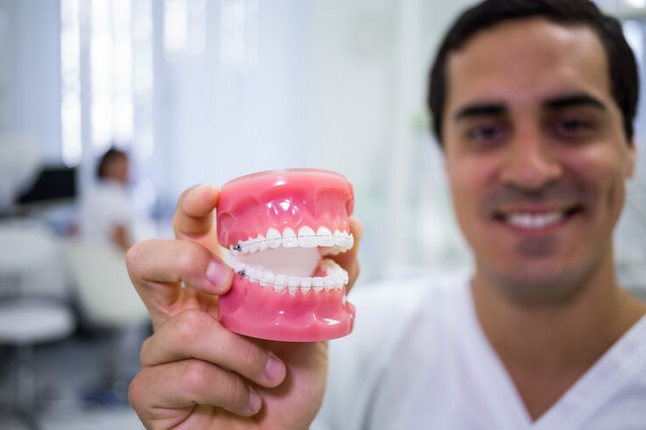Teeth whitening is one of the most popular cosmetic dental procedures globally, offering a quick, non-invasive way to enhance one’s smile. A brighter smile can significantly boost confidence and improve one's appearance. While over-the-counter products like whitening strips, toothpaste, and at-home kits are widely available, many people opt for professional teeth whitening performed by a dentist. Like any cosmetic procedure, visiting a teeth whitening dentist has advantages and disadvantages. This article explores both the pros and cons to help you decide whether professional teeth whitening is right for you.
The Pros of Visiting a Teeth Whitening Dentist
1. Professional Expertise
One of the most significant advantages of visiting a dentist for teeth whitening is their professional expertise. Dentists are trained to understand the complexities of dental health, and they can assess your teeth and gums before the procedure to ensure that whitening is safe for you. They can identify any underlying issues, such as cavities or gum disease, that must be addressed before teeth whitening. This level of personalised care ensures that the procedure is safe and effective.
2. Customized Treatment:
When you visit a dentist for teeth whitening, the treatment is tailored to your needs. Dentists use professional-grade whitening agents, stronger and more effective than over-the-counter products. They can adjust the concentration of the whitening agent to achieve your desired brightness level while minimising the sensitivity risk. Additionally, dentists can target specific areas that need more attention, ensuring a more even and consistent result.
3. Faster Results
Professional teeth whitening provides faster and more noticeable results than at-home treatments. A single visit to a dentist can make your teeth several shades whiter, whereas over-the-counter products may take weeks or even months to show similar results. This is particularly beneficial for individuals who need quick results for a special occasion, such as a wedding, job interview, or photo shoot.
4. Long-Lasting Effects
The effects of professional teeth whitening tend to last longer than those achieved with over-the-counter products. Dentists use high-quality whitening agents and advanced techniques that penetrate the enamel to remove deep stains. Additionally, dentists can provide custom-fitted trays for at-home maintenance, which can help prolong the results of your whitening treatment.
5. Safe and Controlled Environment
Teeth whitening procedures performed by a dentist take place in a controlled environment, reducing the risk of complications. Dentists take precautions to protect your gums and other soft tissues from the whitening agent, which can irritate if it comes into contact with them. They also monitor the procedure closely, ensuring it is done safely and effectively.
The Cons of Visiting a Teeth Whitening Dentist
1. Cost
One of the most significant drawbacks of professional teeth whitening is the cost. The procedure is typically more expensive than over-the-counter products, which can be a barrier for some individuals. The price can vary depending on the dentist, the type of whitening treatment, and your location, but it generally ranges from a few hundred to over a thousand dollars. For those on a tight budget, this may make professional whitening less accessible.
2. Potential Sensitivity
Teeth whitening, whether done professionally or at home, can cause tooth sensitivity in some individuals. The bleaching solid agents used in professional treatments can increase tooth sensitivity, particularly to hot or cold temperatures. While dentists take precautions to minimise sensitivity, it can still occur, especially if you have dental issues or a history of sensitive teeth. However, this sensitivity is usually temporary and can be managed with desensitising toothpaste or other treatments your dentist recommends.
3. Time Commitment
While professional teeth whitening provides faster results, the process still requires a time commitment. Depending on the severity of staining and the desired level of whitening, you may need multiple sessions to achieve your goals. Each session typically lasts about an hour, and you may need to schedule follow-up appointments for maintenance. Finding time for these appointments can be challenging for individuals with busy schedules.
4. Maintenance Requirements:
Even though professional teeth whitening can provide long-lasting results, maintenance is necessary to keep your teeth looking their best. You may need to avoid certain foods and drinks, such as coffee, tea, red wine, and berries, which can stain your teeth. Additionally, you may need to use special whitening toothpaste or at-home whitening trays to maintain the results. Without proper maintenance, your teeth may start discolouring again, requiring additional treatments.
5. Not Suitable for Everyone
Professional teeth whitening is only suitable for some. Individuals with certain dental conditions, such as gum disease, tooth decay, or severe enamel erosion, may not be candidates for the procedure. Additionally, teeth whitening only works on some types of stains. For example, it is less effective on intrinsic stains, which are located inside the tooth and may not be effective at all on crowns, veneers, or fillings. If your teeth have inherent stains or if you have extensive dental work, your dentist may recommend alternative treatments, such as veneers or bonding, to improve the appearance of your smile.
Conclusion
Visiting a teeth whitening dentist offers several advantages, including professional expertise, customised treatment, faster results, long-lasting effects, and a safe environment. However, it has some drawbacks, such as cost, potential sensitivity, time commitment, maintenance requirements, and limited suitability. Ultimately, the decision to undergo professional teeth whitening should be based on your needs, budget, and dental health. Consulting with a dentist can help you determine whether this procedure is correct and how to achieve your desired results best. By weighing the pros and cons, you can make an informed decision and enjoy the benefits of a brighter, more confident smile.





Comments